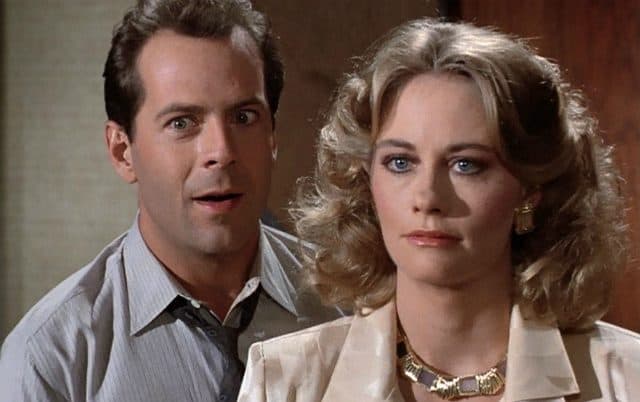
Even though Moonlighting wasn’t the first show of its type, it’s probably the most famous – and infamous – “will they or won’t they” TV show ever. This is the show that gave the television industry the myth of the Moonlighting curse. The one-hour dramedy starred Cybill Shepherd and Bruce Willis as Maddie Hayes & David Addison and boasts some of the most fun and creative scenes on television. (Granted, the scenes owe much to films of the 1930’s and 40’s.) Moonlighting won both actors Golden Globe awards as best actors in a comedy or musical. It also had a ton of Emmy nominations – including a win for Willis as best actor in a drama. (Don’t ask. Even today the entertainment industry still hasn’t figured out how to categorize dramedy.) It’s his work on Moonlighting that led to Willis getting the movie DieHard – which led to him becoming the megastar he is today.
Here’s a fan-made video of show clips that will give you a sense of what makes this madcap dramedy a classic will they or won’t they:
[youtube https://www.youtube.com/watch?v=fTR6M6WrG0c?rel=]
Whet else made Moonlighting so great? It was smart TV, referencing classic literature, movies with a both a tongue-in-cheek humor and true artistry. Iconic scenes like, “Big Man on Mulberry Street” and the Emmy award-winning episode, “Atomic Shakespeare” (Maddie and David cast in Shakespeare’s “Taming of the Shrew” won awards for editing) are just a couple of the outstanding things about the show people will mention. Both of the above happened in season three. Yet, even before that season the show had become both popular and a critical success. The fun and rapid dialogue, steamy chemistry between Maddie and David, and irreverent fourth wall commentary such as in the skit below, was already famous.
[youtube ?rel=0&showinfo=0]
Having the actors break the fourth wall by directly addressing the audience was done often on Moonlighting and it worked perfectly. The laughs were great – even though some of these skits were actually thrown in to fill airtime because the rapidly spoken dialogue would sometimes make the show fall short of the allotted time for the show (wiki/Moonlighting_(TV_series). As innovative as this particular solution was, it can’t mask that problems involving filling airtime and getting filming done may have contributed to the show’s demise.
Because the show was so creative and its showrunner so exacting, Moonlighting was notorious for not completing episodes on time and having to air reruns. Episodes like, “The Dream Sequence Always Rings Twice” cost a whopping two million dollars to make – in 1985 – and took sixteen days to shoot! Nevertheless, it’s hard to argue that the time and money spent on the episode wasn’t worth it. This fan-made montage uses scenes from the eleven minutes of black-n-white filming that caused all the time and expense.
[youtube https://www.youtube.com/watch?v=mA-e5vGalnk?rel=0]
What Killed the Show: The Real Curse of Moonlighting
It wasn’t just big showstoppers (pun intended!) that caused time problems. Even with a “normal” episode scripts often weren’t ready on time. Actors often got their pages an hour before they had to film it. There isn’t a single season where the show actually filmed the twenty-two episodes they were supposed to! That had to be wearing on everyone involved, and it was lousy for building and keeping an audience. Still, had that been the only issue, I suspect Moonlighting would have gone more seasons and kept its ratings up and legacy clean. Why? Because up through most of season three, the audience kept coming back – even with the delays! However, since those delays weren’t the only problem they likely exacerbated everything else.
Moonlighting Season Three: The Best and Worst of Times
Ultimately what started out as a brilliant, sexy and unique television show took a bad turn near the end of season three – but not in the way the proponents of the Moonlighting Curse suggest. For them, Maddie and David getting together was the worse thing ever and the show’s downfall. This is a quote from the 1987 L.A. Times review of, “I am Curious,” which derides both the choice of the Maddie and David getting together and how that coupling was literally done.
Where on Earth does “Moonlighting” go from here? There seem to be only two possible directions. One is for the pair to marry and become another Nick and Nora Charles, merrily solving crimes between bouts of witty repartee. The other is for them to abide by Maddie’s wishes and pretend they never were lovers. They could then presumably resume the flirtation that was the centerpiece of the show before David and Maddie got introspective about themselves. (…)
By its creators’ capitulating to the fan mail and maneuvering its two leading characters, who are supposed to be business partners, into bed, “Moonlighting” has already turned from a sophisticated and lighthearted combination of comedy and crime-solving into a soap opera, a “Hill Street Blues” or “Dallas” without the numerous secondary characters and their problems to leaven the exclusive, tedious focus on a single couple.
The most alarming aspect of this new turn for “Moonlighting,” however, isn’t the imminent implosion of this hitherto charming television show. It is the utter lack of romantic feeling with which David and Maddie consummated their love. If, indeed, it could be called love, for neither of the two has ever expressed any affection for each other beyond professional camaraderie.
FYI: Hill Street Blues was nominated for various Emmy awards every year it was on the air – including in 1987 and is considered to have elevated television drama to a level never before seen. Meanwhile Dallas never pretended it wasn’t a soap-opera – instead the show reveled in it! In 1987 Dallas was the eleventh highest rated show on television and had won that viewer popularity contest known as the People’s Choice Awards.
In other words these two shows were not very good choices for the author to suggest the producers were off-base in their choice. Sadly though, her description of romance on TV is one that the industry still believes is true: focus on a single couple is tedious. Why is it that commentary on “will they/won’t they” storylines so often mention Nick and Nora Charles as a bad thing a show needs to avoid – while saying it’s a unique, classic, and successful pairing? This married couple had a fun dynamic that everyone loved and yet any show that emulates it is doomed? It makes no sense! (Heck, they even had a kid. You didn’t see him much, but still.)
Although they are anecdotal, these two archived comments on the article show the complete disconnect that industry reviewers can sometimes have from the show’s actual audience. The first one agrees with the author’s view that the way the couple got together wasn’t ideal…but has a very different idea about how it should be fixed.
I suspect the writers will realize they put the cart before the horse and will attempt a storyline that returns to repartee and romance, following with a show of true character vulnerability, and then, only then, back to bed-this time with all the risk and surrender about which Low wrote. KELLY JONES Van Nuys
In other words, Ms. Jones wanted more emotional intimacy, romance and having Maddie and David getting “introspective.”
The second response to the article is more scalding:
I wonder if Charlotte Low has ever actually seen an episode of “Moonlighting” (” `Moonlighting’: Life After Doing It,” May 17).
She failed to mention that the reason Maddie turned down the proposal of “Mr. Perfect” (the Yalie astronaut played by Mark Harmon) was because of her feelings for David, which are obviously more than just “professional camaraderie.” She also failed to mention that David did not exactly show up to “pursue Maddie,” but rather to apologize for interfering in her relationship with astronaut Sam.
Also, in the “morning after” episode in question, David offered to leave the agency if it would make Maddie more comfortable. They are unable to admit their love for each other because he is afraid to leave himself open to rejection, and she is afraid to commit herself to a man which her better judgment tells her should be totally wrong for her. (…) For an editor of a magazine called Insight, Low possesses remarkably little of the stuff. KATHERINE CARLISLE Huntington Beach
Aftermath: The Myth of the Moonlighting Curse
After season three Moonlighting started a long skid downward before crashing and burning in its fifth season. This pivotal turn is where the myth of the “Moonlighting Curse” comes from. At the time, and for a long time after, the show’s writers and producers blamed the show’s sliding ratings on Maddie and David having sex in that next to last episode of season three. This quote is from a 1999 Entertainment Weekly interview with the show’s writer and creator Glenn Gordon Caron:
I’m not Machiavellian. If I were, Bruce and Cybill would’ve never ended up in bed–which is still considered one of TV’s great storytelling blunders.
It’s now 2016 and it’s amazing how many TV executives, actors and viewers will still say this like it’s a fact. The myth of the Moonlighting curse is why today so many shows drag out putting couples together. It’s become the scapegoat for when a show’s ratings start to decline. Certainly the role of fairy tales in Western culture has set up the idea that once the prince gets the princess it’s game over, but it’s hardly the only story model in existence. Fairy tales don’t justify why the myth of the Moonlighting curse still has a stranglehold on what the industry thinks about will they or won’t they TV shows. There has to be more to it than that.
In pondering this mystery, consider the fact that, aside from the show’s creator, the only person at ABC who realized that Bruce Willis was a guy women would find hot was Ann Daniel. Luckily she was the head of development at ABC. According to Carson, (in a truly fabulous story) she’s the one who, after ABC had turned down casting Willis eleven times, spoke up in a roomful of male executives and managed to get Willis greenlighted. Stories like that are a clue as to who at the time was likely responsible for coming up with the idea – a bunch of male television executives who believe the most exciting thing about a relationship is the chase.
Truth from The Dark Side of the Moon….
It’s not until the commentary on the 2006 season three DVD release of Moonlighting (The segment is called “Memories of Moonlighting.”) that some of the real reasons the show tanked gets highlighted. There Caron admits he never thought that Maddie and David getting together was what screwed things up, and others note that the episode where the two got together was the single highest rated episode of the series and the heavy viewer response to the network that told them that the audience really cared about the relationship of these characters.
You would think that would give everyone involved with the show a clue about what the viewers were interested in – but it didn’t. The premiere of season four had Maddie and David break up by the end of it, so there is literally only one full episode where they’re together – the season three finale – and in that one Maddie was already expressing doubts! Season four proceeded to separate the characters and put them in different cities for many episodes. When Maddie is finally on her way back to being in the same city as David she marries some random guy she met on the train! All of these things were inane plot choices and chemistry killers.
Now, some of the above bad writing decisions came out of behind-the-scenes issues. The show was dealing with:
- a highly creative showrunner with major time-management issues
- leads that came to hate each other (during that time, not now)
- Willis’s broken clavicle
- Shepard’s difficult pregnancy
- Willis on his way to becoming a major star – even though Shepard was the headliner when the show started.
All of the above contributed to the decisions made during the last two seasons. However, in an interview for Emmy Legends Caron elaborates on his disagreement with the “Moonlighting Curse.” There he takes responsibility for the choice at the end of season four to have Maddie marry someone else in order to try to “recreate” the chemistry of earlier seasons. (Shepard actually felt this was a terrible idea and out of character – but was overruled.) He also suggests that he and Shepard weren’t exactly getting along by that point and that he therefore left the show. However, it’s hard to pinpoint exactly when Caron was completely uninvolved with Moonlighting. In one 1999 EW.com interview he says he was gone for the last year and a half of it, which would seem to overlap the ongoing relationship after Maddie ends up maried to some stranger. Perhaps the friction affected his choices even prior to his leaving?
Whatever the exact reasons, the choice to have Maddie be with someone else was the final nail in the show’s coffin: the audience had no interest in Maddie and David not being together. This isn’t just supposition. In the same Emmy Legends interview cited previously Caron says that as soon as the episode aired phones at the network were, “ringing off the hook” with how much viewers hated the marriage move! (Remember, this was pre-internet and Twitter.) Another point he makes is that for the last part of the series he wasn’t around. For him it meant he couldn’t do the follow-through he would have liked to have done regarding the relationship of Maddie and David. Caron feels that if he’d been there to shepherd the story – and if there had not been so many other complications – the relationship could have worked for many seasons. Being that those other complications are what led to the horrible marriage idea in the first place, he may have a point. …That’s a pretty big “if” though!
The Wrap Up
Because the two of you couldn’t figure out your nitwit relationship they’re giving the rest of us the hevho – along with the two of you!
In terms of the show’s narrative, she’s right. Splitting up Maddie and David is ultimately what crashed the ratings for Moonlighting. If there is a “Moonlighting Curse” it’s that other, “will-they or won’t they” TV shows have had behind-the-scenes issues occur on their shows affect on-screen choices. Furthermore, the same type of bad choices Moonlighting made continue to be repeated. (See: Castle, Lois and Clark: the New Adventures of Superman, The X-Files, Bones). There isn’t much one can do about behind-the-scenes drama. However, until the idea that a couple being together will kill a show’s ratings is seen as the mythological nonsense that it is, the curse of Moonlighting will be striking many shows to come.
 Follow Us
Follow Us





